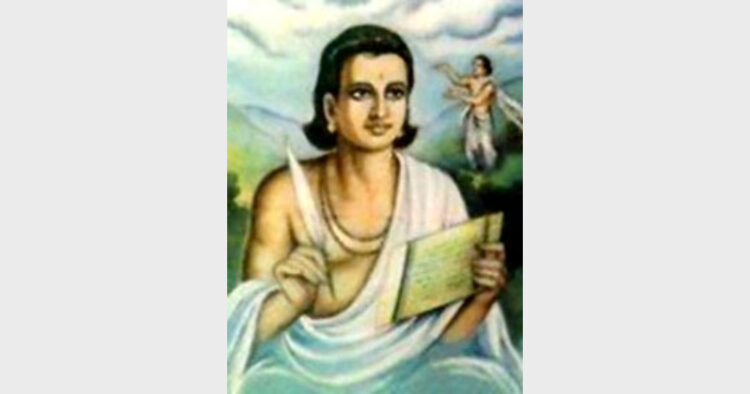KIDS' ORG
By Anoop Verma
One of the greatest poets and dramatists that the world has ever known, Kalidasa is generally believed to have flourished in the 4th or the 5th century AD. However, many scholars are of the opinion that Kalidasa might have been an even more ancient figure. He was definitely close to the ruling class, because his literature carries the feeling of a lofty language that would be more appealing to a refined court audience. These plays have stood the test of time, and they continue to be an intellectual treat for the erudite class as well as for the common readers of modern India. Today it is difficult for us to imagine Sanskrit literature without taking into account the distinct and glorious contributions that Kalidasa made many centuries ago.
According to one traditional account Kalidasa was born in Benares, to a Brahmin family. He was six months old when he became an orphan and was adopted by an ox-driver. Though he didn’t have any formal education, he grew up into a handsome and well-mannered man. The princess of Benares had rejected many suitors, among them a senior member of her father’s court, because she wished to marry a scholar and poet of high calibre. The rejected member of the court developed a plan to extract cruel revenge. He picked up Kalidasa from the street and gave him the garments of a learned person, and a retinue of eminent thinkers. Thereafter, he brought him in presence of the princess. Kalidasa had already been coached that he was not supposed to open his mouth in front of the princess; in response to anything she said, he was only supposed to make random gestures, which would be interpreted by the thinkers accompanying him.
According to the legend, the princess was smitten by Kalidasa’s beauty and by his obstinate silence, which she thought was a sign of profound wisdom. She expressed the desire of marrying him, and so they departed for the temple. While the marriage ceremony was on, Kalidasa perceived the image of a bull, and he could not stop himself from behaving like an ox-driver. The bride was furious, but now it was too late for her to back out. They had already been married. The realisation dawned on Kalidasa that he had made a grave mistake by tricking her into marrying him. When he entreated for forgiveness, she advised him to pray to Goddess Kali for the boon of learning and poetry. The prayer was granted. Eruditeness and poetical power descended miraculously on the young ox-driver who in gratitude towards the Goddess assumed the name of Kalidasa, which means servant of Kali.
Many legends suggest that there was a strong connection between Kalidasa and the court of the King Vikramaditya, who ruled from the city of Ujjain, located in west-central India. Vikramaditya was a noble and powerful ruler; he worked for the welfare of his people and was a great patron of arts and sciences. He had also won glory in war by engineering a decisive victory over barbarians who were pressing into India through the northern passes. In his court, King Vikramaditya is said to have ‘nine gems,’ which included leading intellectuals from the fields of literature, science and religious discourse. Kalidasa was one of the nine gems.
Kalidasa’s affection for the city of Ujjain comes to fore in his lyrical poem Meghaduta (Cloud Messenger). In this poem he has dwelled at length on the city’s charms. He goes to the extent of bidding the cloud to make a detour in its long journey, so that it would not miss the opportunity of witnessing the beauty of the city. His works also indicate that he must have travelled extensively through many different parts of the country. For instance, in the fourth canto of Raghuvamsa (The dynasty of Raghu), he has described an engrossing tour of many far-off lands. It is unlikely that Kalidasa could have given such realistic description without personally experiencing the scenery of those places. The natural landscape that impressed him most was the mountains. His works are full of highly descriptive passages on the Himalayas or other picturesque mountain ranges. He is the only Sanskrit poet in antiquity to have described a flower that grows in Kashmir.
The three dramas that Kalidasa is thought to have written are, Malavikagnimitram ((Malavika and Agnimitra), Abhijñanasakuntalam (Shakuntala) and Vikramorvasiyam (Urvashi won by Valour). All three are written in prose, which is generously intermingled with lyrics and descriptive stanzas. Most scholars are of the opinion that Malavika and Agnimitra was the first play that he wrote. Urvashi won by Valour was his last work. The famous play Shakuntala was written in the middle of his career, when his prowess as a writer was at its peak. Till this day Shakuntala is considered to be a masterpiece, for more than 1,500 years this play has captivated the hearts and minds of people in all parts of the world. The playwrights, who followed Kalidasa, have been highly inspired by his style.
















Comments